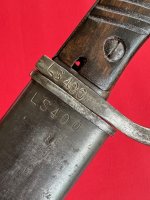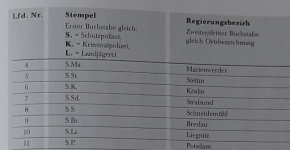ersatz
Well-known member
The title isn't what you would normally think it would mean. It has nothing to do with airplanes. The nA 98/05 Plain Blade bayonet is matched on the cross guard and scabbard as: LS400. It was made by Waffenfrabrik, Mauser A.G., dated W18. Please read on............................
Air surveillance departments, 1922
*The above taken from: German Police Unit Marks, 1920 - 1937.
LS refers to a Province in Saxony. I assume the 400 refers to the Waffen Nr. ? Perhaps a knowledgeable member can enlighten me.
The Weimar Republic's air surveillance department, the Research Office of the Reich Air Ministry (Forschungsamt), primarily focused on monitoring domestic communications, including all forms of communication within Germany and from Germany to foreign countries. Their duties included collecting and intercepting all communications, including telegrams, telephone conversations, personal letters, and printed materials. They also monitored the press and had a network of intercept stations throughout Germany, particularly focusing on high-ranking officials, Nazi Party members, and Reichswehr personnel.
Here's a more detailed breakdown of their duties:
Air surveillance departments, 1922
| Mark | Meaning |
|---|---|
| L.B. | Berlin |
| L.Bg. | Brendenburg |
| L.H. | Hannover |
| L.He. | Hessen-Nassau |
| L.N. | Niederschlesien |
| L.O. | Ostpreussen |
| L.P. | Pommern |
| L.S. | Sachsen |
| L.Sch. | Schleswig-Holstein |
| L.W. | Westfalen |
LS refers to a Province in Saxony. I assume the 400 refers to the Waffen Nr. ? Perhaps a knowledgeable member can enlighten me.
The Weimar Republic's air surveillance department, the Research Office of the Reich Air Ministry (Forschungsamt), primarily focused on monitoring domestic communications, including all forms of communication within Germany and from Germany to foreign countries. Their duties included collecting and intercepting all communications, including telegrams, telephone conversations, personal letters, and printed materials. They also monitored the press and had a network of intercept stations throughout Germany, particularly focusing on high-ranking officials, Nazi Party members, and Reichswehr personnel.
Here's a more detailed breakdown of their duties:
- Domestic Communication Monitoring:
The Forschungsamt's main task was to collect and analyze all communications within Germany and from Germany to other countries.
- Surveillance of Key Individuals:
They paid particular attention to the communications of high-ranking government officials, Nazi Party members, and Reichswehr personnel.
- Intercepting Communications:
They intercepted telephone conversations, telegrams, and other forms of communication.
- Monitoring the Press and Printed Materials:
They also monitored the press and all printed materials.
- General Delivery Letters:
Surveillance of general delivery letters formed a large part of their work.
- Spy Network:
They gradually built a large spy network throughout Germany, with interception stations and agents in various locations.
Collaboration with Other Agencies:
They collaborated with other intelligence agencies, such as the Abwehr, which focused on foreign espionage.




